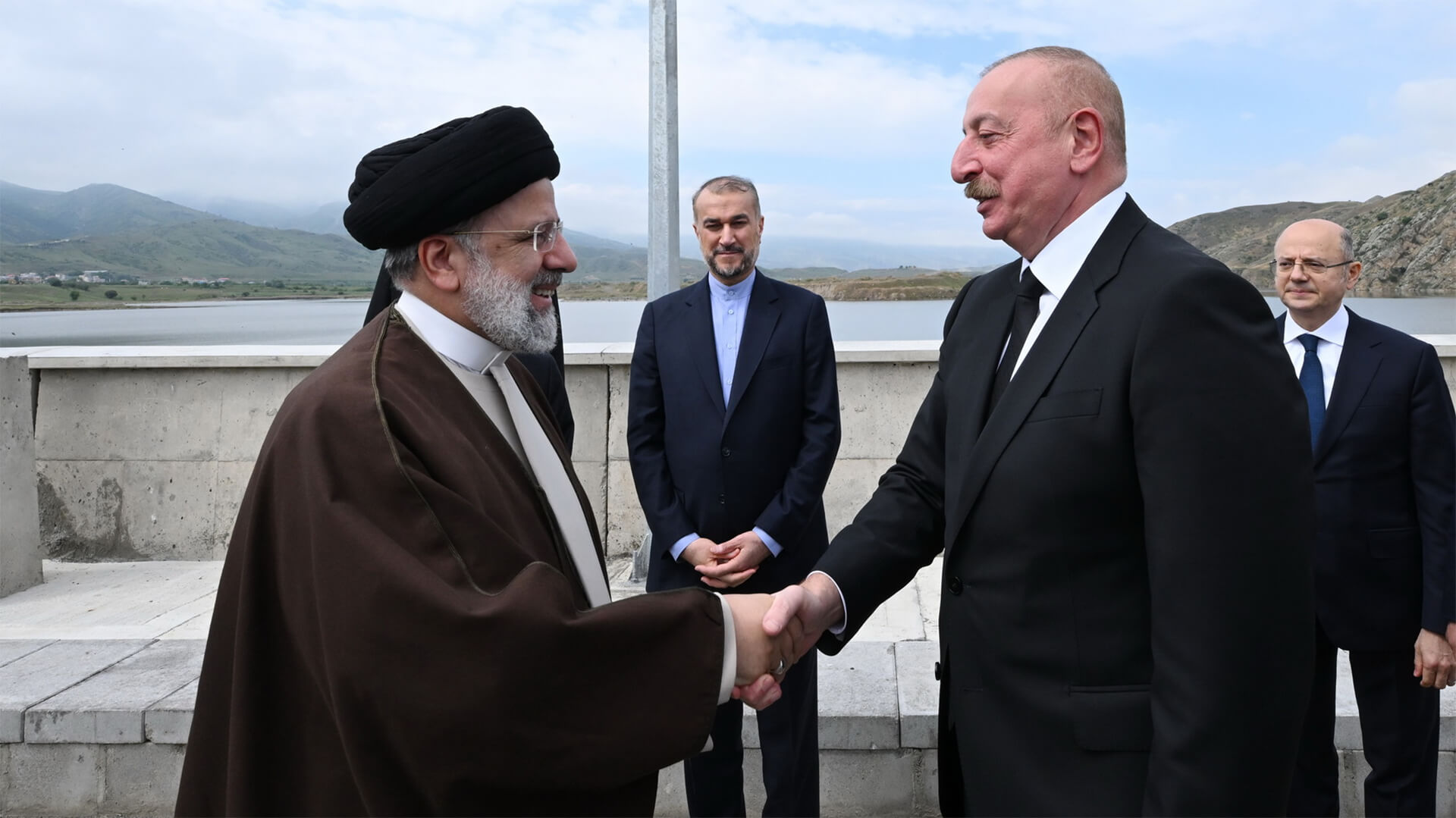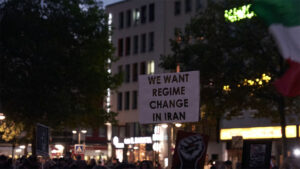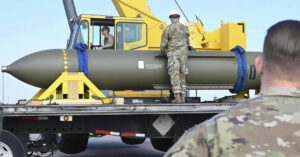WEBINAR – Peter Zeihan’s Risk List: What Keeps a Geopolitical Strategist Up at Night
Please join Peter Zeihan for a webinar on June 5th at 12:00 PM EST on a topic that is near and dear to the hearts of the Zeihan on Geopolitics team: geopolitical risk. This webinar will feature Peter’s reasonable-fear list, focused on issues that in his opinion have the most potential to impact market outcomes.
Iranian State media has confirmed the death of Iranian President Ebrahim Raisi May 19th, following the crash of his helicopter over Iranian Azerbaijan. Raisi was returning from a ceremony inaugurating the joint Iranian-Azerbaijani Qiz Qalasi dam project. Iran’s Foreign Minister Hossein Amir-Abdollahian has also reportedly died in the crash—but Iran has no shortage of capable diplomats, and his death certainly doesn’t rise to the level of global geopolitical significance.
Iranian media initially held out some hope for a rescue, but the region’s rugged terrain, dense fog and cold temperatures stymied efforts to locate the crash site in a timely manner. Whether or not Raisi died on impact holds little geopolitical importance. Likewise, I’d argue, his death by itself does not present a significant loss of capability or capacity for the Iranian regime.
But this is Iran we’re talking about. Iranians’ flair for the dramatic and gold chandeliers aside, Iran and its bad behavior are a favorite topic for the world’s politicians and media outlets. Recent tensions between Israel and Iran have only exacerbated what would be the normal run of rumors at a time like this. So, we’re left with two big questions:
- Did someone kill the Iranian president?
- What’s next for the corridors of power in Iran?
Raisi, a hardline clerical figure, gained significant notoriety for overseeing the harsh crackdown of Iran’s 2022 protest movement. He is one in a line of presidents who have been at the helm of the Iranian government since the founding leader of the Islamic Republic, Ayatollah Ruhollah Khomeini died in 1989.
Plenty of people within the country and especially outside of Iran’s borders are likely toasting his demise. Wanting him dead and having the capability to do so are two entirely different things, however. Iran’s various separatist movements are highly unlikely to have the sophistication and technology to correctly identify and shoot down Raisi’s helicopter, especially given weather conditions. (Raisi was travelling with other officials and at least three other helicopters at the time of the crash.) So too are regional terror groups, like ISIS-Khorasan, unlikely culprits.
Tensions between Iran and Azerbaijan have only risen in recent years as the Aliyev regime has grown closer to Israel (as well as Turkey and the West). But despite Baku’s recent military successes against Armenia, I really doubt Azerbaijan would shoot down the Iranian president.
Which brings us to the question everyone really has on their mind: Did the Israelis do it?
The short answer? I don’t know. And likely neither does anyone else. I might be wrong here, but I also don’t think the Israelis have a lot to gain right now by shooting down the sitting president of a regional adversary. The aftermath would be incredibly ugly and would do little to change Israel’s current risk profile: love him or hate him (most people probably hated him), Raisi is not the center of power inside Iran.
Since 1989, current Supreme Leader Ayatollah Khamenei has managed the convoluted and often-times competing factions of the various religious, political, and economic centers of Iranian power. He is old and, if we believe well-sourced Israeli and American intelligence figures who leak to the media, been dying for the past 20 years. (He’s 85 and we’re more likely to get there sooner than not…)
Did the Ayatollah get rid of Raisi? Probably not. Many Iran watchers would argue that Raisi was on the short list of clerics likely to eventually replace the current Supreme Leader. Was it someone within the Islamic Revolutionary Guard Corps? Another political rival? Not likely. While Raisi was often mentioned as a significant obstacle to nuclear talks with the rest, no one figure in Iran has enough veto power over a policy point (and perhaps not even the Supreme Leader) to stymie a nuclear détente with the West. And Iran was scheduled to have presidential elections in a year. There are certainly less… fraught ways to get rid of a president in Iran.
The simplest explanation would be that the president’s plane simply had an unfortunate accident at a very inconvenient time. Most of Iran’s aircraft are Franken-zombie constructs, a product of successful Western sanctions limiting Iran’s ability to get new technology and parts. Pre-1979 Western equipment is kept alive with a mix of indigenous knock-off components and whatever schlock can get in from Russia and China. Russian and Chinese aircraft and parts are often second-or-third-hand purchases from intermediaries looking to avoid sanctions. And then there’s Brazil: Embraer is no slouch when it comes to small and medium-sized planes, to be sure. And Iran and former/current Brazilian President Lula da Silva are old friends. But not even the President of Brazil can bend US sanctions to his will; Iran has seen its plans to buy a fleet of second-hand jets stall for years as Washington’s most formidable lawyers and accountants work tirelessly to keep the planes grounded.
Bad weather, bad fog, and bad parts make for good chances for an accident. We might learn that more nefarious things were afoot, but there’s certainly not a lot of reason now to jump to that conclusion.
Which brings us to our second question: what comes next for Iran?
Per the constitution, Iran’s First Vice President Mohammad Mokhber becomes acting president. If you haven’t heard of him, don’t worry: neither have any of the pundits and media figures who will become overnight experts on the guy. While Mokhber has ties both numerous and deep to several institutions within the Islamic Republic, he is the definition of a loyalist benchwarmer. By design.
The Iranian constitution lays out that Acting President Mokhber, the Speaker of the Iranian Parliament and the head of the judiciary must arrange for a new election in 50 days. (Contrast this with the US, where VP Kamala Harris would simply serve the rest of President Joe Biden’s term). This is where things might get tricky.
Raisi joins a growing line of Iranian presidents who have overseen brutal crackdowns on Iranian protests. Many within Iran will cheer his passing. Will his death and upcoming elections trigger fresh protests?
This is certainly possible and, if I was a betting man, I’d say probably likely. If for no other reason, protests are no longer a rare or unlikely occurrence within Iranian society. I don’t expect them to fundamentally hasten the end of the regime, though it could distract Tehran from its current regional adventures (Iran, Syria, Hezbollah, and to the extent they have influence, Hamas). But history also shows us that when Iran is more insecure about domestic security, it is more likely to remind regional adversaries of just how hard it can hit beyond its borders.
Here at Zeihan On Geopolitics we select a single charity to sponsor. We have two criteria:
First, we look across the world and use our skill sets to identify where the needs are most acute. Second, we look for an institution with preexisting networks for both materials gathering and aid distribution. That way we know every cent of our donation is not simply going directly to where help is needed most, but our donations serve as a force multiplier for a system already in existence. Then we give what we can.
Today, our chosen charity is a group called Medshare, which provides emergency medical services to communities in need, with a very heavy emphasis on locations facing acute crises. Medshare operates right in the thick of it. Until future notice, every cent we earn from every book we sell in every format through every retailer is going to Medshare’s Ukraine fund.
And then there’s you.
Our newsletters and videologues are not only free, they will always be free. We also will never share your contact information with anyone. All we ask is that if you find one of our releases in any way useful, that you make a donation to Medshare. Over one third of Ukraine’s pre-war population has either been forced from their homes, kidnapped and shipped to Russia, or is trying to survive in occupied lands. This is our way to help who we can. Please, join us.
TranscripT
Hey everyone. Peter Zeihan here coming to you from the Mediterranean coast. It is the morning of May 20th, and the news at the moment is that late last night, local time, helicopter went down and Iranian Azerbaijan in the north of the country and on board was Iranian President Gracey. And he perished. the Iranians don’t use GPS like we do in the United States, because they think that is an end for American intelligence.
Of course, they don’t use the Russian system either. so it took them many, many hours to find him. And it was bad weather and it was cold. It was foggy. And by the time they found the crash site, he was gone. for a country with Iran that is so, desperate for this dramatic, this is obviously not a great thing to happen, and it’s obviously not a great time for anything to happen, because there’s a lot of movement in a lot of places in the Middle East.
We have the Israelis trying to box the Iranians in strategically by getting a peace deal with the United States and Israel. We have a number of other Arab states looking to follow their lead. we’ve got the Gaza war. We have the Ukraine war. We’ve got the Chinese starting to put out feelers in the Middle East to see if they can become a regional power there as well.
a lot is going on. So of course, everyone, everyone, everyone is talking about how he died, how he could have died, how he could have been assassinated. And I don’t want to rule out any particular theory right now, but, it probably doesn’t matter. Raisi is like any other Iranian president before him getting more and more and more involved in violence in the region and more and more involved with the violence at home.
so it’s not that nobody wants the guy dead. It’s there’s very few people out there who don’t want the guy dead. But at the current moment, killing it doesn’t really achieve anything. Because first and foremost, the Iranian president is nowhere near the most powerful person in Iran. That would be Ayatollah Khamenei, the supreme leader. in fact, we were going to have elections later this year, so somebody in the regime wanted him gone.
There’s much simpler ways to do so. I also don’t think that we’re in a situation in the Middle East right now where violence is naturally just going to explode. The Iranians and the Israelis have actually figured out how to step back from mutual confrontation to a degree. I mean, I don’t want to overplay this. It’s still the Middle East.
And so there is no immediate reason for the Israelis wanting to be gone. And if risk is replaced by just another ultra-Orthodox hardliner, you know, it’s like, what changes, you were talking about variations on the theme. There’s always personal reasons. He’s, contributed to the death of a lot of people. And there is a lot of families out there who would like to see him gone.
But again, there’s nothing new here, and there’s nothing that really moves the needle for me. everybody has their own pet theory. I’m not going to bother lining them up and knocking them down. I will just underline that Iran has been under sanctions as regarding its air force and its aviation, civilian and military for 40 years at this point.
So you’re talking old vehicles being maintained by second, third and fourth hand parts that can sneak through the sanctions airframes that were designed to be pulled from service in the mid to late 80s. And this is what he was flying because this is all they have. And so the idea that this is simply a mechanical failure in bad weather remains the dominant.
Theory. But that’s the likelihood here as to what happens next. There is a caretaker vice president who will take over. He said do that. No one has heard of before. He has no ambition and no talent, so he’ll be sidelined. I mean, this isn’t like the United States, where the vice president just steps in and serves the remainder of the term.
And it’s certainly about like Europe, where the Parliament gets together and chooses a new prime minister. he wasn’t that important. And he’s going to be replaced by someone who is even less important. And then we will have elections to decide who will take the spot. at the moment that the only risk here is that the natural drama of the Persians, boil up or someone on the outside chooses.
This is the opportunity to attempt to destabilize a country that actually hasn’t been destabilized. And then we would be reminded that Iran has a lot of paramilitary operations well beyond its borders. So I kind of find myself, as in this situation, is when Iran launched their deliberately botched attack on Israel a few weeks ago. this is a chance, an opportunity to calm things down.
And normally in the Middle East, I would say no, grab it. But we’ve had several incidences like that in the last few months. So maybe, just maybe, Rossi leaving this Earth will be an opportunity for a little bit more calm in a region that is unexpectedly become the calmest in the world. Take your good news where you can.








